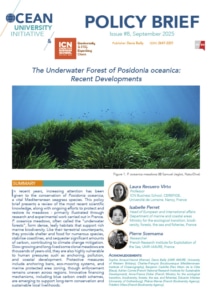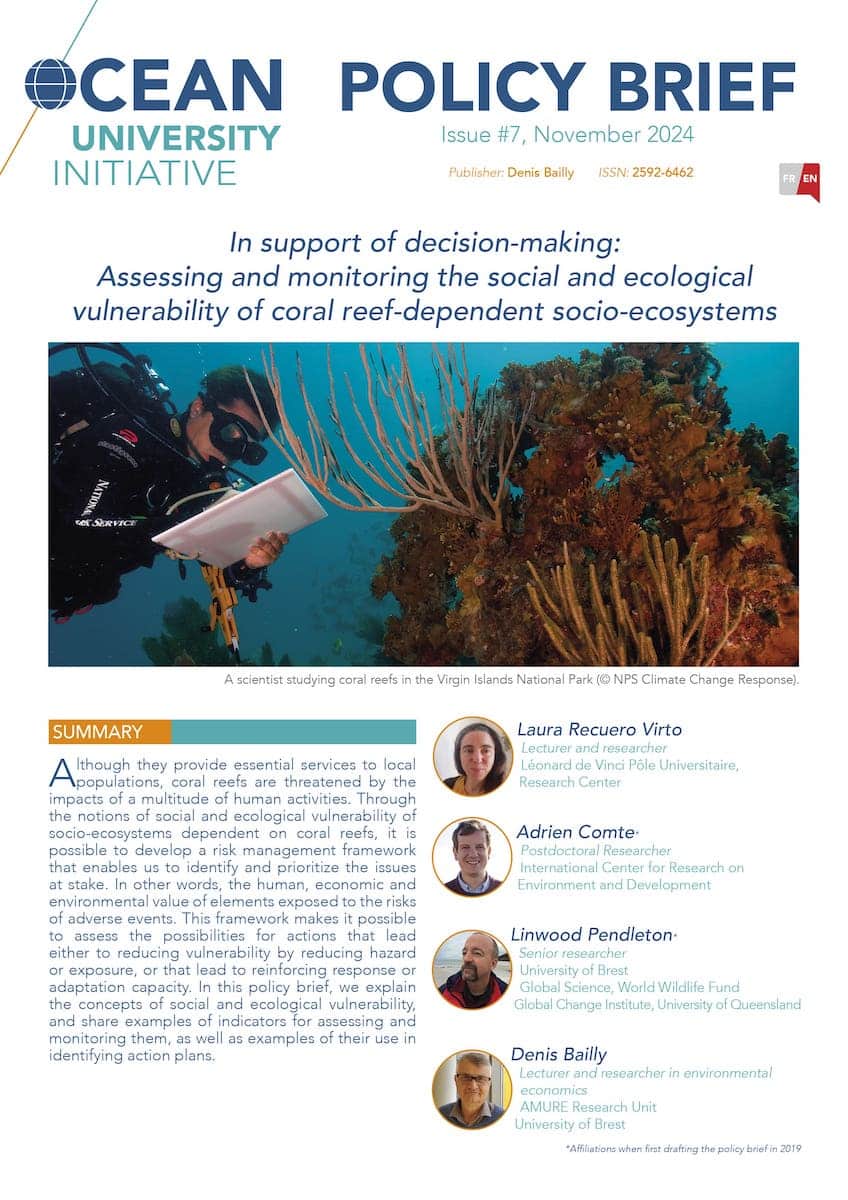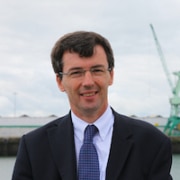The Underwater Forest of Posidonia oceanica: Recent Developments
 In recent years, increasing attention has been given to the conservation of Posidonia oceanica, a vital Mediterranean seagrass species. This policy brief presents a review of the most recent scientific knowledge, along with ongoing efforts to protect and restore its meadows – primarily illustrated through research and experimental work carried out in France. P. oceanica meadows, often called the “underwater forests”, form dense, leafy habitats that support rich marine biodiversity. Like their terrestrial counterparts, they provide shelter and food for numerous species, stabilise coastlines, and sequester significant amounts of carbon, contributing to climate change mitigation. Slow-growing and long-lived some clonal meadows are thousands of years-old, they are also highly vulnerable to human pressures such as anchoring, pollution, and coastal development. Protective measures include anchoring bans, eco-mooring systems, and marine protected area zoning, though enforcement remains uneven across regions. Innovative financing mechanisms, including blue carbon credit schemes, are emerging to support long-term conservation and sustainable local livelihoods.
In recent years, increasing attention has been given to the conservation of Posidonia oceanica, a vital Mediterranean seagrass species. This policy brief presents a review of the most recent scientific knowledge, along with ongoing efforts to protect and restore its meadows – primarily illustrated through research and experimental work carried out in France. P. oceanica meadows, often called the “underwater forests”, form dense, leafy habitats that support rich marine biodiversity. Like their terrestrial counterparts, they provide shelter and food for numerous species, stabilise coastlines, and sequester significant amounts of carbon, contributing to climate change mitigation. Slow-growing and long-lived some clonal meadows are thousands of years-old, they are also highly vulnerable to human pressures such as anchoring, pollution, and coastal development. Protective measures include anchoring bans, eco-mooring systems, and marine protected area zoning, though enforcement remains uneven across regions. Innovative financing mechanisms, including blue carbon credit schemes, are emerging to support long-term conservation and sustainable local livelihoods.
Issue Date:September 2025
| ISSN printed version 2647-2201 |
| ISSN digital version 2592-6462 |
Suggested quote:
Recuero Virto L., Perret I., Scemama P., 2025. The Underwater Forest of Posidonia oceanica: Recent Developments. Ocean University Initiative, Policy Brief, Issue 8, Univ Brest, France.
In support of decision-making: assessing and monitoring the social and ecological vulnerability of coral reef-dependent socio-ecosystems
 Although they provide essential services to local populations, coral reefs are threatened by the impacts of a multitude of human activities. Through the notions of social and ecological vulnerability of socio-ecosystems dependent on coral reefs, it is possible to develop a risk management framework that enables us to identify and prioritize the issues at stake. In other words, the human, economic and environmental value of elements exposed to the risks of adverse events. This framework makes it possible to assess the possibilities for actions that lead either to reducing vulnerability by reducing hazard or exposure, or that lead to reinforcing response or adaptation capacity. In this policy brief, we explain the concepts of social and ecological vulnerability, and share examples of indicators for assessing and monitoring them, as well as examples of their use in identifying action plans.
Although they provide essential services to local populations, coral reefs are threatened by the impacts of a multitude of human activities. Through the notions of social and ecological vulnerability of socio-ecosystems dependent on coral reefs, it is possible to develop a risk management framework that enables us to identify and prioritize the issues at stake. In other words, the human, economic and environmental value of elements exposed to the risks of adverse events. This framework makes it possible to assess the possibilities for actions that lead either to reducing vulnerability by reducing hazard or exposure, or that lead to reinforcing response or adaptation capacity. In this policy brief, we explain the concepts of social and ecological vulnerability, and share examples of indicators for assessing and monitoring them, as well as examples of their use in identifying action plans.
Issue Date:November 2024
| ISSN printed version 2647-2201 |
| ISSN digital version 2592-6462 |
Suggested quote:
Recuero Virto L., Comte A., Pendleton L., Bailly D., 2024. In support of decision-making: assessing and monitoring the social and ecological vulnerability of coral reef-dependent socio-ecosystems. Ocean University Initiative, Policy Brief, Issue 7, Univ Brest, France.
Sustainable Development Goal 14 on the ocean

The importance of the ocean for sustainable development has been firmly acknowledged in the 2030 Agenda for Sustainable Development through Sustainable Development Goal 14. During a workshop organized by the Ocean University Initiative for the French Ministry of Ecological Transition on May 29, 2019 in Brest, some of these goals, notably to manage and combat the negative effects of fisheries subsidies, noise and plastic pollution, were analyzed, enabling the identification of areas for future research detailed in this policy brief. Some research topics are particularly important. Firstly, the implementation of target 14.6 on harmful fishing subsidies requires applied research into the economic, ecological and social impacts of public policies. Secondly, there is a strong need for harmonized measures to assess the impact of noise on marine fauna (invertebrates and vertebrates). Thirdly, marine pollution reduction target 14.1 should initially focus on plastic packaging, which accounts for almost half of the world’s marine plastic waste.






Issue Date : September 2023
| ISSN version papier 2647-2201 |
| ISSN version numérique 2592-6462 |
Suggested quote:
Recuero Virto L., Daures F., Guyader O., Chauvaud L., Maes C., Huvet A., 2023. Sustainable Development Goal 14 on the ocean, some insights on fisheries subsidies, noise and plastics. Ocean University Initiative, Policy Brief, Issue 6, Univ Brest, France.
Consumption, technology and wellbeing

This policy brief highlights the insights subjective well-being metrics bring to the understanding of the relationship between consumption and happiness. We explore this topic in the advent of expected significant price increases under the double impact of higher climate volatility and the costly transition to cleaner production and transportation technologies, as it is the case with maritime transport.
People appear to be sensitive to price increases, on top of the real purchasing power of price and income changes regarding their happiness. Moreover, the type of consumption matters, with a lower marginal effect of material consumption on wellbeing compared to experiential consumption. Health, social relationships and local environment are considered as main drivers of their wellbeing and de-emphasise consumption.
A key outcome is that the gains of additional consumption decrease with the level of consumption, making consumption reductions less painful at the upper end of the revenue scale. Rich societies should be actively working on further decoupling material consumption and well-being by consciously exposing the elusive nature of the well-being boost we get from conspicuous consumption (goods others can readily observe: car, clothing, house, watches) and provide incentives for more socially and environmentally responsible modes of consumption.




Issue date: July 2023
| ISSN printed version 2647-2201 |
| ISSN digital version 2592-6462 |
Suggested quote:
Perona M., Recuero Virto L., Sèbe M., Yao F., 2023. Consumption, technology and wellbeing. Ocean University Initiative, Policy Brief, Issue 5, Univ Brest, France.
Including Coastal Ecosystems in Nationally Determined Contributions (NDCs)
 The effects of climate change are growing and are already having dramatic consequences, particularly for coastal populations in developing countries (IPCC, 2018). In 2015, by adopting the Paris Agreement, the international community committed to reducing the magnitude of ongoing climate change through the development of national action plans, called Nationally Determined Contributions (NDCs). Five years after signing the Agreement, it appears that the States must undertake drastic efforts to raise their climate ambitions. The ocean, which plays a key role in stabilizing the climate, offers many mitigation and adaptation solutions (Gattuso et al., 2018). Among them, proper management, conservation and restoration of coastal ecosystems can help meet both the challenges posed by climate change and the decline in biodiversity, while increasing human well-being. This policy brief explores the challenges of the inclusion in NDCs of such actions based on emblematic coastal ecosystems: mangroves, coral reefs, seagrasses and salt-marshes.
The effects of climate change are growing and are already having dramatic consequences, particularly for coastal populations in developing countries (IPCC, 2018). In 2015, by adopting the Paris Agreement, the international community committed to reducing the magnitude of ongoing climate change through the development of national action plans, called Nationally Determined Contributions (NDCs). Five years after signing the Agreement, it appears that the States must undertake drastic efforts to raise their climate ambitions. The ocean, which plays a key role in stabilizing the climate, offers many mitigation and adaptation solutions (Gattuso et al., 2018). Among them, proper management, conservation and restoration of coastal ecosystems can help meet both the challenges posed by climate change and the decline in biodiversity, while increasing human well-being. This policy brief explores the challenges of the inclusion in NDCs of such actions based on emblematic coastal ecosystems: mangroves, coral reefs, seagrasses and salt-marshes.

Issue date: February 2021
| ISSN printed version 2647-2201 |
| ISSN digital version 2592-6462 |
Suggested quote:
Châles F., 2021. Including Coastal Ecosystems in Nationally Determined Contributions (NDCs). Ocean University Initiative, Policy Brief, Issue 4, Univ Brest, France.
Underwater noise
 There are increasing concerns about the impact of underwater noise on marine life spurred by the steady rise in the number and variety of human activities at sea. In particular, chronic noise levels from commercial shipping have increased significantly in the past 60 years and they are set to continue to rise in the coming years. In response to this concern, the United Nations has signed a voluntary commitment to reduce underwater noise (#OceanAction18553), which recognizes the negative impact that shipping noise can have on marine life. In this policy brief, we examine the role of ports in reducing this type of noise and illustrate our findings through a case study of the port of Le Havre.
There are increasing concerns about the impact of underwater noise on marine life spurred by the steady rise in the number and variety of human activities at sea. In particular, chronic noise levels from commercial shipping have increased significantly in the past 60 years and they are set to continue to rise in the coming years. In response to this concern, the United Nations has signed a voluntary commitment to reduce underwater noise (#OceanAction18553), which recognizes the negative impact that shipping noise can have on marine life. In this policy brief, we examine the role of ports in reducing this type of noise and illustrate our findings through a case study of the port of Le Havre.





Issue date: August 2020
| ISSN printed version 2677-6847 |
| ISSN digital version 2677-934X |
Suggested quote:
Recuero Virto L., Dumez H., Galichon P., Le Courtois F., Muntoni M., 2020. Underwater noise, what can we learn from the port of Le Havre case study? Ocean University Initiative, Policy Brief, Issue 3, Univ Brest, France.
Questions about Marine Protected Areas (MPAs)
 The problem of MPAs is not the lack of knowledge about the marine environment, but managing of people, that is, managing the different uses in these areas. Thus, it is much easier to identify MPAs than to manage them effectively, not only in waters under national jurisdiction, but even more so in areas beyond national jurisdiction. Another problem is not enough collegial and transparent scientific committees to ensure good scientific governance of MPAs.
The problem of MPAs is not the lack of knowledge about the marine environment, but managing of people, that is, managing the different uses in these areas. Thus, it is much easier to identify MPAs than to manage them effectively, not only in waters under national jurisdiction, but even more so in areas beyond national jurisdiction. Another problem is not enough collegial and transparent scientific committees to ensure good scientific governance of MPAs.


Issue date: November 2018
ISSN : 2647-2201
Suggested quote:
Recuero Virto L., Thiaw M., 2018. Questions about Marine Protected Areas (MPAs). Ocean University Initiative, Policy Brief, Issue 2, Univ Brest, France.
Monitoring Sustainable Development Goal 14 on the ocean
 This policy brief explains the role of Sustainable Development Goal 14 on the Ocean and points to the related major initiatives of the United Nations through a short interview with Vladimir Ryabinin, Executive Secretary of the Intergovernmental Oceanographic Commission. It sets out the relevance of indicators for monitoring the SDG 14 agenda, illustrates progress in this area globally and nationally in France and South Africa, goes over certain coordination challenges and highlights future areas of research.
This policy brief explains the role of Sustainable Development Goal 14 on the Ocean and points to the related major initiatives of the United Nations through a short interview with Vladimir Ryabinin, Executive Secretary of the Intergovernmental Oceanographic Commission. It sets out the relevance of indicators for monitoring the SDG 14 agenda, illustrates progress in this area globally and nationally in France and South Africa, goes over certain coordination challenges and highlights future areas of research.



Issue date: November 2018
ISSN : 2647-2201
Suggested quote:
Recuero Virto L., Didier A-F., Kitamori K., 2018. Monitoring Sustainable Development Goal 14 on the ocean. Ocean University Initiative, Policy Brief, Issue 1, Univ Brest, France.






